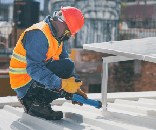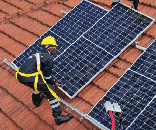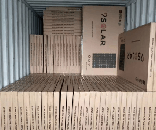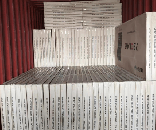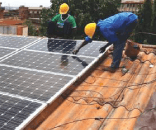The renewable energy sector is one of the fastest-growing sectors in Nigeria. One of the reasons this sector flourished is the great desire for Nigerians to find a cheaper alternative to power.
Solar power is an efficient way to reduce power costs for your homes and businesses, and it is also the best way to restore the greenness of the environment and lower the carbon footprint.
However, while considering the potential of installing solar, there are essential things to learn. You should also learn to consider these factors before investing in solar products.
Factors to consider before investing in Solar Power
1. Roof and House Condition
Solar products come in different shapes, sizes and specifications. In some cases, the solar home system requires installing solar panels on the roof.
The first step is to check the roof. How old is the roof? What shape of your roofing? If you feel a part of the roof is damaged or too old, you may need to repair it.
Your roof condition must outlast your solar panel to save you maintenance costs. Otherwise, you may need to pay extra for uninstalling the panels after some years when repairing the roof.
Also, depending on the shape and size of your roofing system, ensure there is enough space to accommodate your panels. You may not be able to maximise solar energy if your panels are not strategically placed.
The maximum solar energy comes from the east; however, the experts say your panels should face the south or west. This information helps you figure out how to incline your solar panel installation.
2. Amount of Energy Needed
The next matter to resolve is to analyze how much energy you need. You can easily estimate the energy requirements by listing the power requirements of your appliances. Also, you may want to consider how often you need to power them.
For instance, how many light bulbs, mobile phones and laptops do you need to power or charge and how often? Would you like to power your TV and other related appliances? Will you need to replace it with energy-saving appliances?
If you need more help concerning energy plans, we recommend you mail info@9solar.ng. Remember to compare this monthly estimate with your current cost of providing power.
3. Cost of Solar and How much is saved using solar
Learning about the solar installation cost should be married to how much you get to save. The cost is an excellent factor to consider when planning to go solar, and a comparative analysis of all associated costs over a reasonable time can help your decision.
Meanwhile, the payment plan is equally important in your cost of investing in solar. For example, consider outright solar payments, instalments, loans, or leases. Moreover, are there special offers and promos?
By comparing your current energy cost with the cost of running solar for a period, you can decide which option is better. Also, consider other factors such as maintenance fees, durability, reliability and environmental effect.
4. The Weather and Climate in your area
The efficiency of your solar power installation directly hinges on the atmospheric condition of your area. The simplest way to comprehend this is the amount of sunlight your site has.
On the one hand, a cloud area with high rainfall may not generate much solar energy. In comparison, areas with long sunny days and clear sky can immensely benefit the solar system.
An easy solution is to go for high-efficiency solar panels to generate a higher amount of solar energy. The other side of the weather factor is extreme conditions that may harm your installation.
5. Available types of solar
When it comes to choosing your solar package, many options are available. Your product may include mounted solar panels, shingles or movable panels. In comparison, the most typical type is mounted solar panels.
These panels are often made of silicon cells and have the highest efficiency for the price. As for the movable solar panels, they retain the advantage of moving along the sun’s path.
Solar shingles produce less energy and cost more than others. They are suitable for people who prefer smaller solar panels. You will need to decide which of these options is perfect for your power needs. The available solar types are one of the things to know before investing in solar.
6. Will solar be the only source of electricity.
While you consider installing a solar home system, you should decide if that will be your only source of electricity. An on-grid solar panel system retains your connection to the city’s grid, which means you can still get electricity when you need it.
Using solar power alone will mean that you have sure storage and a high amount of daily sunlight. Another reason to stay off-grid is power generators, all of which require professional hands to integrate.
7. Solar warranty
The next issue is the length of your solar panel warranty. There are usually two types of warranties: the performance and the product warranty. While the first address the manufacturer’s guarantee of performance, the other is the level of protection for any product issue.
Also, the first one may last between 25 and 30 years while the other is usually between 15 and 25 years. However, there may be one or two exceptions to both warranties. So, you need to inquire about both types from the manufacturer.
The length of the warranty the manufacturer is willing to give indicates the reliability of the system. However, the level of warranty may vary from one manufacturer to another.
8. Payment
Now that you have decided to go solar, you should consider the payment options available. Of course, you can go for outright payment from any solar store, physical or online, and payment is one of the things to know before going solar.
9. DIY installation of solar home systems
One interesting question people often ask us is if they can install solar products with the DIY approach. Whether or not DIY works for you depends on the type of solar product you purchase.
The recommended method is to hire a professional. But if you insist on DIY, you should prepare for the following phases.
- You will need help wiring the home or office where you intend to use the solar. Otherwise, you may risk electrical shocks. Consult the manual or seek professional help.
- A Leaky roof. If your roof is leaking, remember that installing solar panels requires boring holes. Therefore, you should apply sealers to avoid leaks or further damage to the roof.
- Safety standards and rules. Watch out for some SHS that mandates a professional installation not to nullify your warranties. Moreover, the DIY approach also risks damaging the device during installation.
10. Prepare for maintenance
Indeed, solar panels do not cost you anything, yet you should keep the surface in perfect condition. The first step is to read through the manual on maintaining.
Generally, you need to clean the solar panel surface once every three months. Remember also that a good maintenance culture can affect the lifespan and efficiency of the system.






